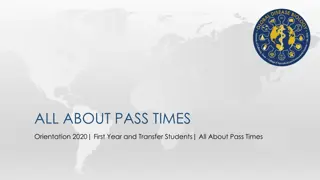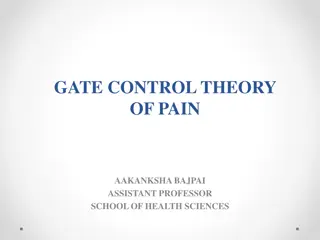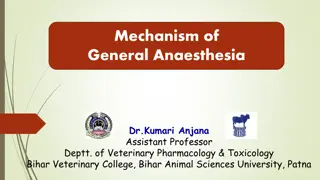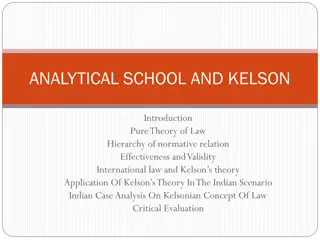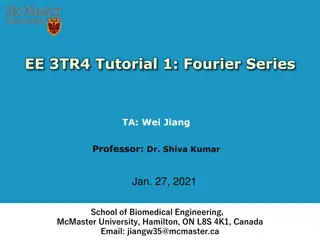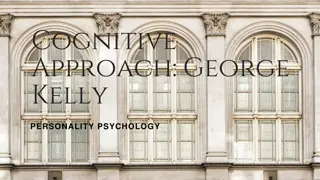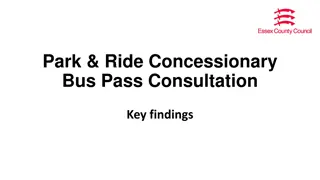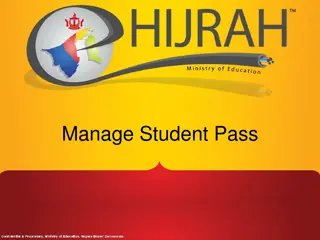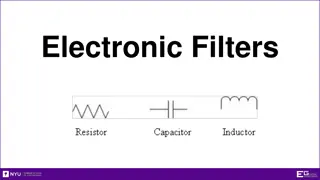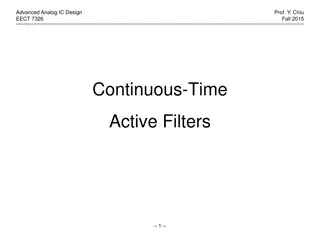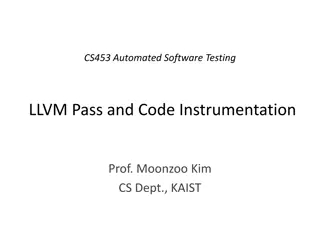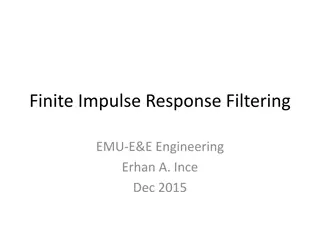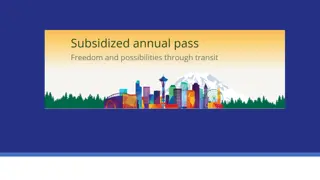Coworking Space Day Pass in Dehradun
Experience flexibility and productivity with the Coworking Space Day Pass in Dehradun at Co Spaces. Elevate your workday with seamless access to our vibrant coworking environment for a single day. Enjoy the perks of a fully-equipped workspace, high-speed internet, and the chance to connect with like
0 views • 4 slides
Ginzburg Landau phenomenological Theory
The Ginzburg-Landau phenomenological theory explains superconductivity and superfluidity as distinct thermodynamic phases. It focuses on phase transitions characterized by singularities in specific heat at the transition temperature. Derived from BCS theory, it quantifies condensation energy, emphas
1 views • 38 slides
Crystal Field Theory in Transition Metal Complexes
Crystal Field Theory (CFT) explains the colors and magnetic properties of transition metal complexes. It focuses on the energy changes in d-orbitals of metal ions caused by surrounding ligands. This theory, developed in 1929, provides insights into the bonding interactions in complex compounds. The
10 views • 44 slides
Understanding Social Learning Theory and the Power of Example
Social Learning Theory, introduced by Bandura, emphasizes learning through observation and modeling. It explores how individuals acquire behavioral dispositions, trial-and-error experiences, and the impact of stimuli in the environment. The theory focuses on the importance of attention, retention, a
1 views • 17 slides
Evolution of Mathematical Theories and Proof Systems
Development of mathematical theories such as model theory, proof theory, set theory, recursion theory, and computational complexity is discussed, starting from historical perspectives with Dedekind and Peano to Godel's theorems, recursion theory's golden age in the 1930s, and advancements in proof t
1 views • 29 slides
All About Pass Times
Understanding pass times is crucial for course registration at UC Davis. This guide explains what pass times are, what to do if you miss them, how to use Schedule Builder, where to find your pass time, and how to register for classes effectively. Don't miss out on securing your desired courses!
0 views • 10 slides
Introduction to Organizational Behavior: Management Theories and Practices
Explore the evolution of organizational behavior from early management theories to contemporary practices. Understand the historical foundations and relevance of management theory in shaping workplace dynamics. Delve into key concepts like Scientific Management, Administrative Management, Bureaucrat
1 views • 28 slides
Theories on the Origin of State: Divine, Force, Patriarchal, and More
Various theories such as Divine Origin, Force Theory, Patriarchal Theory, and others explain the origin of the state. Divine theories attribute state creation to God, while Force Theory emphasizes the strong subjugating the weak to establish authority. Each theory offers unique perspectives on the h
1 views • 24 slides
Understanding Forgetting: Theories and Influence on Memory Recall
Forgetting is a complex phenomenon influenced by theories such as Decay Theory, Interference Theory, and Motivated Forgetting. The Ebbinghaus forgetting curve highlights how memories fade over time. Decay Theory suggests memories decay over time, while Interference Theory explains how old and new me
0 views • 25 slides
Psychological Theories of Criminality: Understanding the Roots
Psychological theories of criminality delve into the association between intelligence, personality, learning, and criminal behavior. Major theories include Psychodynamic Theory by Freud, Behavioral Theory by Bandura, and Cognitive Theory by Kohlberg. These theories explore how unconscious mental pro
1 views • 20 slides
Austin's Theory of Law by Rinkey Sharma: An Overview
Austin's Theory of Law, presented by Rinkey Sharma, delves into the Imperative Theory of Law as proposed by Austin, known as the father of English jurisprudence. It explores General and Particular Jurisprudence, Austin's definition of law, and the elements of positive law, emphasizing the concepts o
0 views • 11 slides
Theories of International Relations Overview
The field of International Relations (IR) encompasses various theories that seek to explain global phenomena, drawing from disciplines like history, philosophy, and economics. Theory, derived from contemplation and speculation, organizes ideas to explain issues such as state emergence, conflict caus
1 views • 47 slides
Understanding the Gate Control Theory of Pain in Pain Management
This detailed content delves into the Gate Control Theory of Pain, explaining pain pathways involving nociceptors, A-delta fibers, and C fibers. It further explores central pain pathways like the spinothalamic tract, spinomesencephalic tract, and spinoreticular tract. The theory's mechanism of pain
3 views • 11 slides
Overview of Cooperative Game Theory and Bargaining Solutions
Cooperative game theory explores situations where players have mutual benefits in cooperating. The focus is on bargaining solutions to reach agreements despite conflicting interests. Key concepts include Nash Bargaining Solution, Kalai-Smorodinsky Bargaining Solution, and Rubinstein Bargaining Proce
1 views • 24 slides
Understanding the Theory of Firms: Neoclassical vs. Modern Approaches
The theory of firms is explored through the Neoclassical and Modern perspectives. Neoclassical theory focuses on profit maximization, while Modern theory delves into managerial, principal-agent, and transaction cost theories. The discussion covers criticisms of Neoclassical theory and the essential
1 views • 79 slides
Mechanism of General Anaesthesia Theories: Lipid Solubility, Surface Tension, Microcrystal, Protein Binding
Mechanism of general anaesthesia involves theories focusing on the interaction of anaesthetics with cell membrane components like lipids and proteins. The Lipid Solubility theory emphasizes the importance of an anaesthetic's affinity and solubility in nerve cell membranes, while the Surface Tension
1 views • 10 slides
Analytical School and Kelson's Pure Theory of Law: A Critical Analysis
Kelsen's Pure Theory of Law emphasizes the hierarchy of norms and the normative character of law, free from extra-legal elements. This theory, in contrast to other perspectives like Hart's, aims to maintain the purity of law by isolating strictly legal components. Kelsen's focus on normative behavio
1 views • 15 slides
Understanding Post-Authorisation Safety Studies (PASS) in Pharmacovigilance
Post-Authorisation Safety Studies (PASS) are conducted after a medicinal product is authorized to gather more safety information or assess risk management effectiveness. These studies evaluate the safety and benefit-risk profile of the product, aiding regulatory decision-making. PASS aims to identif
0 views • 4 slides
Designing Low-Pass Filter for Square Wave Harmonic Suppression
This tutorial discusses the design of a low-pass filter to suppress harmonics in the output of a square wave signal. The goal is to achieve at least 32 dB attenuation of any harmonics relative to the fundamental sinusoid at 5 kHz. The solution involves analyzing the square wave, determining the nece
0 views • 18 slides
Understanding George Kelly's Personal Construct Theory in Personality Psychology
George Kelly's Personal Construct Theory explains how individuals perceive and organize their world by formulating and testing hypotheses, just like scientists. These personal constructs shape our unique views of events, influencing how we interpret reality and make decisions. Kelly's theory of cons
0 views • 23 slides
Insights from Park and Ride Concessionary Bus Pass Consultation
Essex County Council conducted a public consultation in 2019 regarding proposed changes to the Concessionary Bus Passes on their Park and Ride services. The consultation gathered 1,494 responses, primarily from pass holders aged between 65 and 74, with some respondents having disabilities. The key p
0 views • 9 slides
Theories of Causation in Psychological and Social Sciences
Overview of theories of causation categorized into psychological, social psychological, and sociological perspectives. Psychological theories focus on instinctive, biological, and psychological qualities of abusers, including Attachment Theory, Psychodynamic Theory, Social Learning Theory, and Situa
0 views • 15 slides
Understanding Political Theory through a Contextual Approach
Exploring G.H. Sabine's perspective on political theory through a contextual approach, emphasizing the importance of historical context and societal influences. Sabine argues that while political theory evolves with its contemporary politics, it should be analyzed within its specific time and social
0 views • 9 slides
Understanding Active Filters: Low Pass and High Pass Filter Designs
Explore the world of active filters, specifically 1st and 2nd order low pass and high pass filters. Learn about their circuit designs, advantages over passive filters, gain equations, frequency responses, and practical steps for designing custom low pass filters. Dive into the realm of frequency-sel
6 views • 12 slides
Evolution of Light Theory: From Wave Theory to Quantum Theory
At the turn of the century, the discovery of the photoelectric effect challenged the wave theory of light, leading to the development of the quantum theory by Max Planck and Albert Einstein. This new theory introduced the concept of discrete energy units known as quanta, bridging the gap between wav
1 views • 62 slides
Student Pass Management System Overview
Student Pass Management System provides a smooth process flow for renewal and issuance of student passes efficiently. The system allows School Admin to create new student pass applications and manage the renewal process seamlessly. It offers features like registering for student passes, updating app
0 views • 44 slides
Dp-branes, NS5-branes, U-duality, and M-Theory Overview
Overview of Dp-branes, NS5-branes, and U-duality derived from nonabelian (2,0) theory with Lie 3-algebra. Introduction to M-theory, including M2-branes and M5-branes in the strong coupling limit. Discussion on BLG theory, Lorentzian Lie 3-algebra, and the ABJM theory for M2-branes.
1 views • 32 slides
Understanding Time-Independent Perturbation Theory in Quantum Mechanics
Perturbation theory is a powerful tool in solving complex physical and mathematical problems approximately by adjusting solutions from a related problem with known solutions. This theory allows for more accurate approximate solutions by treating the difference as a small perturbation. An example inv
0 views • 19 slides
Ethical Theories: Divine Command vs. Virtue Theory Explained
Divine Command Theory asserts that morality is derived from God's commands, contrasting with Virtue Theory which focuses on developing moral virtues to achieve human flourishing and excellence. Divine Command Theory relies on religious texts, while Virtue Theory emphasizes the cultivation of virtues
0 views • 24 slides
Understanding Fermi Liquid Theory in Interacting Fermion Systems
Fermi liquid theory, also known as Landau-Fermi liquid theory, is a theoretical model that describes the normal state of metals at low temperatures. Introduced by Landau and further developed by Abrikosov and Khalatnikov, this theory explains the similarities and differences between interacting ferm
0 views • 23 slides
Understanding Electrical Filters: Types, Uses, and Frequency Response
Explore the world of electrical filters through this comprehensive guide covering different types of filters, frequency response graphs, and practical applications. Learn about low-pass, high-pass, and band-pass filters, how they work, and their significance in signal processing. Discover the concep
0 views • 24 slides
Computational Learning Theory: An Overview
Computational Learning Theory explores inductive learning algorithms that generate hypotheses from training sets, emphasizing the uncertainty of generalization. The theory introduces probabilities to measure correctness and certainty, addressing challenges in learning hidden concepts. Through exampl
0 views • 43 slides
Automata Theory and Theory of Computation Overview
This course overview covers concepts in automata theory and theory of computation, including formal language classes, grammars, recognizers, theorems in automata theory, decidability, and intractability of computational problems. The Chomsky hierarchy, interplay between computing components, modern-
0 views • 42 slides
Theories of Interest in Microeconomics II
Explore various theories of interest in economics, including the Classical Theory, Liquidity Preference Theory by Keynes, Productivity Theory, Abstinence Theory, Time-Preference Theory, Fisher's Time Preference Theory, and the Loanable Fund Theory. These theories offer different perspectives on the
0 views • 6 slides
Understanding Advanced Analog IC Design and Filtering Techniques
Exploring the world of Advanced Analog IC Design through the concepts of continuous-time active filters, frequency domains, time domains, filter specifications, and examples of passive RLC filters. Delve into the intricacies of different filter types, such as low-pass, high-pass, and band-pass, to e
0 views • 60 slides
Exploring the Evolution of Atomic Theory
Delve into the historical journey of atomic theory starting from Democritus and Aristotle's views to modern advancements proving some aspects of Dalton's theory incorrect. Learn about key laws and theories such as the Particle Theory of Matter, Dalton's Atomic Theory, and JJ Thomson's discoveries, s
0 views • 30 slides
Automated Software Testing with LLVM Pass and Code Instrumentation
This content delves into LLVM Passes, the LLVM Pass Framework, control flow graphs in LLVM IR, and an example Pass implementation called IntWrite for monitoring integer variable updates. It explains the process, concepts, and tools involved in automated software testing using LLVM Passes and code in
0 views • 18 slides
Understanding Finite Impulse Response Filtering in Digital Signal Processing
Explore the concepts of Finite Impulse Response (FIR) filtering in digital signal processing, including filter specifications for low-pass, high-pass, band-pass, and band-stop filters. Learn about frequency normalization, specifications for different filter types, and the transfer function of FIR fi
0 views • 26 slides
Macromechanical Analysis of Lamina and Tsai-Hill Failure Theory Overview
The Tsai-Hill failure theory is based on the strengths of a unidirectional lamina, incorporating longitudinal and transverse tensile and compressive strengths, as well as in-plane shear strength. This theory, derived from the distortion energy theory, provides criteria for determining lamina failure
0 views • 15 slides
ORCA Card Subsidized Annual Pass Enrollment Information
Eligible customers can receive a subsidized annual pass for up to 12 months by enrolling in specific state benefit programs. The pass fully subsidizes trips on Metro and Sound Transit services. To qualify, individuals must be enrolled in certain benefit programs and prove their identity. Enrollment
0 views • 9 slides





